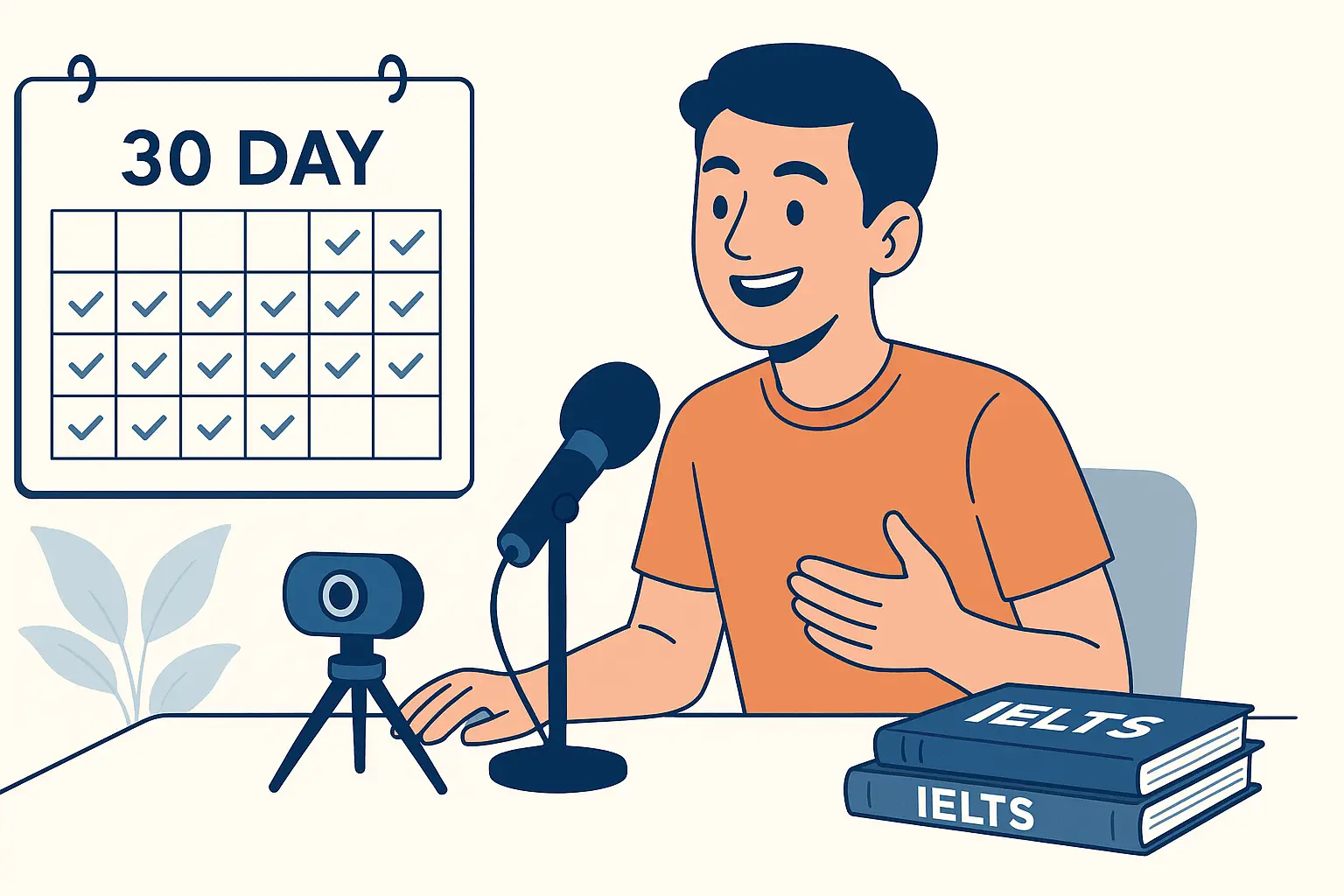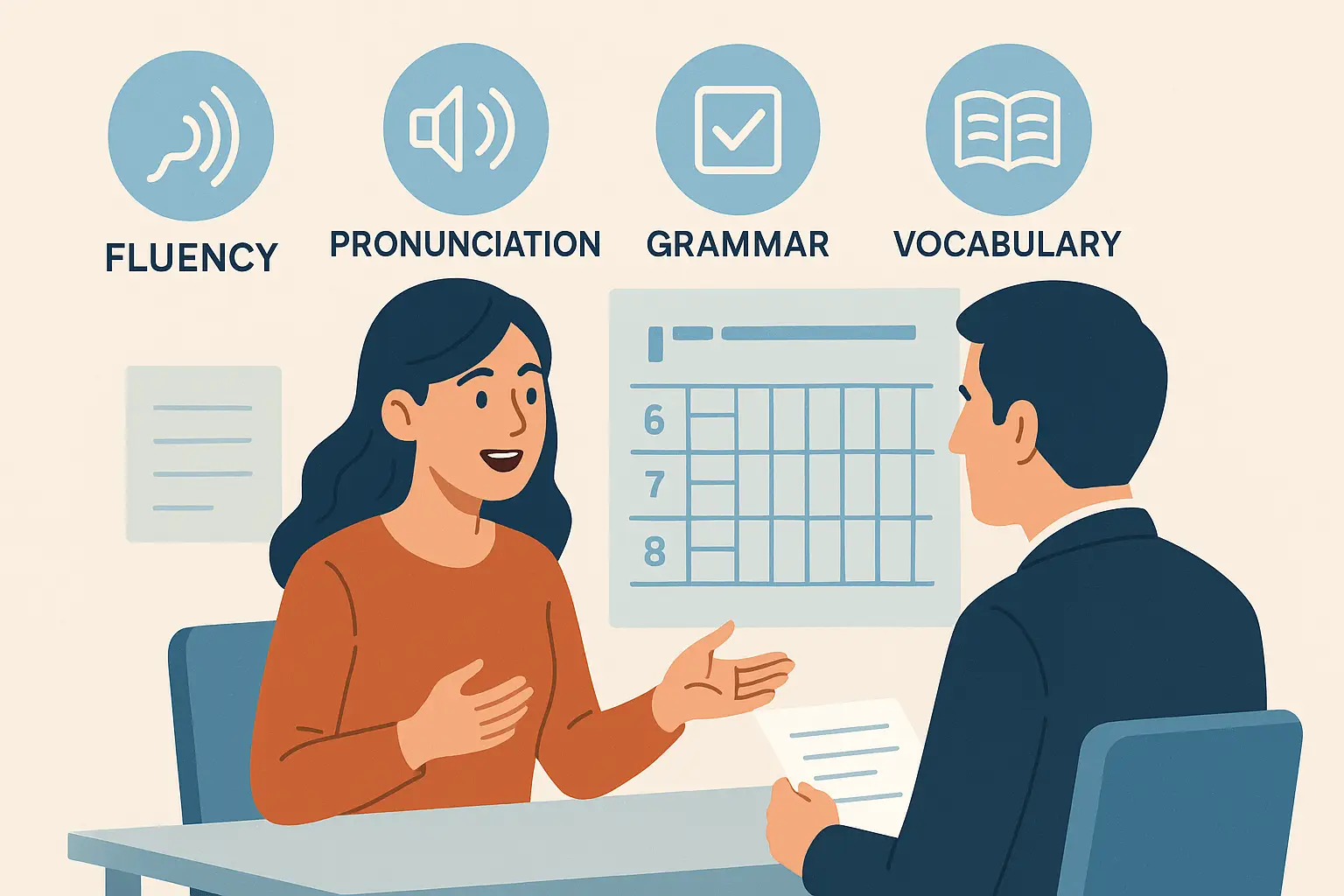When students ask me how to sound more natural in IELTS Speaking, my answer is almost always the same: start using idioms and natural phrases correctly. Over the past decade teaching IELTS to international learners, I’ve noticed a consistent pattern—students who incorporate idioms and phrases for IELTS Speaking not only boost their fluency score but also sound more confident and expressive.
Many of my students have great grammar and vocabulary, but they often sound too “textbook.” That’s where idioms come in. Using them smartly (and sparingly) can transform your answers from robotic to relaxed, helping you hit those higher Band 7–9 scores.
Why Idioms Matter in IELTS Speaking
Idioms aren’t just for fun—they’re part of natural, everyday communication. According to IELTS Speaking Band Descriptors, using “idiomatic language” is one of the criteria for achieving Band 7 and above in Lexical Resource. But here’s the catch: overusing idioms or using them incorrectly can hurt your score.
One student of mine, Ahmed from Egypt, tried to use three idioms in every sentence. It made his speech confusing. After we scaled it back to one idiom per question and focused on natural delivery, his Band score jumped from 6.5 to 7.5.
Common Problems Students Face
Here are the typical struggles I’ve seen in my classroom:
- ❌ Students memorise idioms without understanding context
- ❌ They use idioms too frequently, making answers unnatural
- ❌ They forget to pronounce them correctly, especially under pressure
And this is where structured practice helps. On platforms like British Council and IDP IELTS, you’ll find resources, but rarely a comprehensive list designed for speaking. That’s why I created this guide based on real IELTS situations.
My Personal List: 50 Idioms and Phrases for IELTS Speaking
Here’s a curated list I’ve taught in class, grouped by common IELTS Speaking themes. I encourage students to master 10–15 idioms deeply instead of trying to memorise all 50.
🔹 Daily Life and Routine
- A piece of cake
- On a daily basis
- In the long run
- Call it a day
- Around the clock
🔹 Opinions and Preferences
- To each their own
- In my book
- If you ask me
- Sit on the fence
- Speak your mind
🔹 Success and Challenges
- Hit the nail on the head
- A tough nut to crack
- Rise to the occasion
- Jump on the bandwagon
- Learn the ropes
🔹 Time and Frequency
- Once in a blue moon
- Around the corner
- In the nick of time
- From time to time
- Back in the day
🔹 Emotions and Feelings
- Over the moon
- Down in the dumps
- Have butterflies in your stomach
- Blow off steam
- Get cold feet
🔹 People and Relationships
- A people person
- Hit it off
- Get along like a house on fire
- On the same wavelength
- Break the ice
🔹 Decisions and Problem Solving
- Think outside the box
- At the drop of a hat
- Cut corners
- Take it with a pinch of salt
- Keep an open mind
🔹 Work and Study
- Pull an all-nighter
- Burn the midnight oil
- Go the extra mile
- Call the shots
- By the book
🔹 Describing Habits or Trends
- Old habits die hard
- Keep up with the times
- Set in your ways
- The writing’s on the wall
- A sign of the times
🔹 Communication and Speaking
- Break the news
- Get straight to the point
- A slip of the tongue
- Speak volumes
- Word of mouth
👉 For a full guide on using these naturally in your answers, visit our IELTS Speaking Vocabulary & Expressions Guide.
How to Use These Idioms Without Losing Marks
I always tell my students: Use idioms to enhance, not replace, your natural speech. Here’s how:
- Don’t force it. Use idioms where they naturally fit your message.
- Practice pronunciation. Mispronounced idioms can confuse the examiner.
- Explain with context. If you’re unsure, follow with a simple explanation.
- Use 1 idiom per answer. Quality matters more than quantity.
- Record yourself. Listening back helps you self-correct and sound natural.
For example, when asked about a time I overcame a challenge, a strong answer would be:
“During my final year of university, I had to balance work and study. It was a tough nut to crack, but I learned to manage my time wisely, and in the end, I rose to the occasion.”
Learn More from the Complete IELTS Speaking Guide
This post is just one part of a larger support system I’ve built for learners around the world. If you’re serious about your progress, check out the full IELTS Speaking Complete Guide on IELTS ZONE — packed with tips, Band 9 sample answers, and downloadable resources.
Also explore the official IELTS website for more practice materials and band descriptors.
Idioms and Phrases for IELTS Speaking
Q1: Can I use idioms in IELTS Speaking Part 1?
Yes! Simple idioms like “once in a blue moon” or “a piece of cake” work well. Just don’t overdo it.
Q2: Will I get a higher band if I use lots of idioms?
Not necessarily. Overusing idioms can sound unnatural. Aim for 1–2 well-placed idioms per answer.
Q3: What if I misuse an idiom?
If it affects clarity, it may reduce your fluency or coherence score. Only use idioms you fully understand.
Q4: Are idioms required for Band 7 or above?
Yes. According to official criteria, Band 7+ students show “some awareness of idiomatic language.”
Q5: How can I practise using idioms naturally?
Use apps like voice recorders, speak with partners, or join a speaking club. And always get feedback!
If you’re preparing for the IELTS Speaking test and want to speak naturally, fluently, and confidently, mastering idioms and phrases is a key step — but always remember: natural use beats memorised performance.
Let’s hit the nail on the head — idioms work best when they reflect you. Keep practicing, and see you in the Speaking room!






20 Responses
Thanks for sharing your ideas on this blog. Additionally, a myth regarding the lenders intentions whenever talking about property foreclosure is that the financial institution will not have my payments. There is a fair bit of time that this bank can take payments here and there. If you are as well deep within the hole, they’re going to commonly desire that you pay the actual payment entirely. However, i am not saying that they will not take any sort of installments at all. If you and the loan company can be capable to work one thing out, a foreclosure practice may halt. However, if you ever continue to skip payments beneath new approach, the foreclosures process can pick up exactly where it left off.
Nice post. I learn something totally new and challenging on blogs I stumbleupon on a daily basis.It will always be useful to read through content from other authors and use a little something from other websites.
Hello, I enjoy reading through your article. I wanted to write a little comment to support you.
Thanks for the various tips discussed on this site. I have observed that many insurance carriers offer prospects generous special discounts if they opt to insure more and more cars with them. A significant amount of households own several automobiles these days, particularly people with more mature teenage youngsters still residing at home, and the savings in policies can soon mount up. So it makes sense to look for a bargain.
Hello mates, nice article and fastidious urging commented here, I am actually enjoying by these.